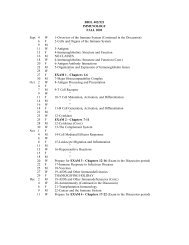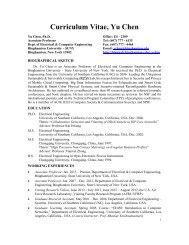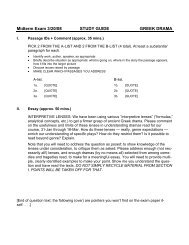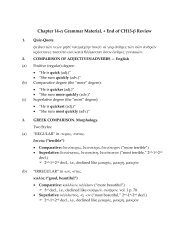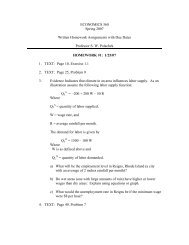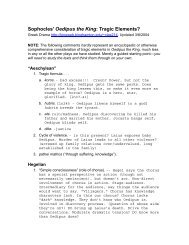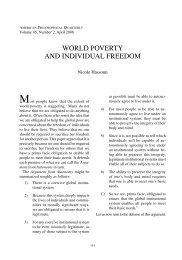Aristotle Poetics - Harvey.binghamton.edu
Aristotle Poetics - Harvey.binghamton.edu
Aristotle Poetics - Harvey.binghamton.edu
Create successful ePaper yourself
Turn your PDF publications into a flip-book with our unique Google optimized e-Paper software.
<strong>Aristotle</strong> <strong>Poetics</strong> 4<br />
10<br />
claimed by the Dorians 17 as their discoveries; comedy by the Megarians—by those in<br />
Greece as having arisen when Megara became a democracy, and by the Sicilian Megarians<br />
18 on the ground that the poet Epicharmus was of their country, 19 and a good deal earlier<br />
than Chionides and Magnes; 20 even tragedy also is claimed by certain of the Peloponnesian<br />
Dorians. 21 In support of this claim they point to the words “comedy”<br />
(komoidia) and “drama.” Their word for the outlying hamlets, they say, is komai, whereas<br />
Athenians call them “demes” (demoi)—thus assuming that comic poets got the name not<br />
from their komoi, or “revels,” but from their strolling from hamlet to hamlet, lack of appreciation<br />
keeping them out of the city. 22 Their word also for “to act,” they say, is dran,<br />
whereas Athenians use prattein. 23<br />
So much, then, as to the number and nature of the points of difference in the various<br />
types of imitation.<br />
4<br />
20<br />
It is clear that the general origin of poetry was due to two causes, each of them part of<br />
human nature. 24 Imitation is natural to human beings from childhood, one of our advantages<br />
over the lower animals being this: that we are the most imitative creatures in the<br />
world, and learn at first by imitation. And it is also natural for all to delight in works of<br />
imitation. The truth of this second point is shown by experience: though the objects themselves<br />
may be painful to see, we delight to view the most realistic representations of them<br />
in art—the forms, for example, of the lowest animals and of dead bodies. The explanation<br />
is to be found in a further fact: to be learning something is the greatest of pleasures, not<br />
only to the philosopher, but also to the rest of humanity, however small our capacity for<br />
it. The reason of the delight in seeing the picture is that one is at the same time learning—<br />
gathering the meaning of things, for instance, that the man there is so-and-so. For if one<br />
has not seen the thing before, one’s pleasure will not be in the picture as an imitation of it,<br />
but will be due to the execution or coloring or some similar cause. Imitation, then, being<br />
natural to us—as also the sense of melody and rhythm, the meters being obviously types<br />
17 Greeks—not Athenians—living on the Peloponnese peninsula (southeast of Athens)<br />
and elsewhere.<br />
18 There were two cities of Megara: one a Dorian city near Athens in Greece, the<br />
other a Greek colony on the island of Sicily.<br />
19 Epicharmus, ca. 490 BCE, was a Sicilian comic poet.<br />
20 Chionides (ca. 488 BCE), Magnes (first victory in 473 BCE): early comic poets at<br />
Athens.<br />
21 Peloponnesian: the Peloponnese peninsula more or less equals southern Greece.<br />
22 It is fairly certain that the word “comedy” (komoidia) comes from komos,<br />
“drunken revel,” plus oide, “song”—“song performed at a drunken revel.” Tragedy<br />
(tragoidia) seems to mean something like “goat song” (tragos, “goat”).<br />
23 prattein: “act,” “accomplish.”<br />
24 Note that in this and the following paragraph, <strong>Aristotle</strong> derives poetry from human<br />
nature: we have poems because we are human; a poet’s inner nature is reflected in<br />
the kind—the genre—of poetry he or she writes. The next section will trace the historical<br />
development of different genres of (Greek) poetry.



